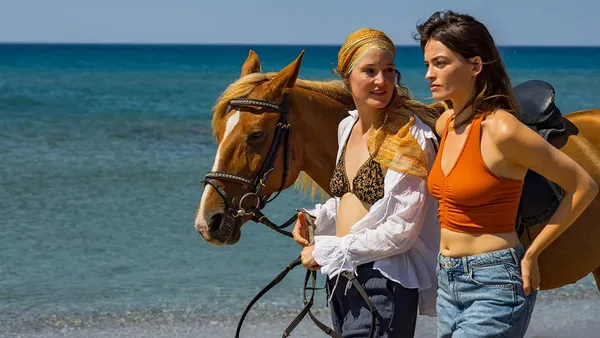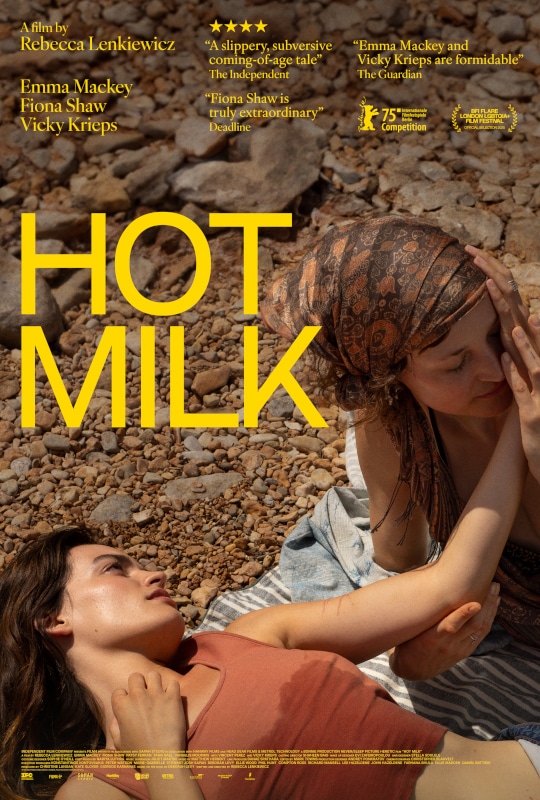Eye For Film >> Movies >> Hot Milk (2025) Film Review
Hot Milk
Reviewed by: Jennie Kermode

Introduced to the specialist, Dr. Gomez (Vincent Perez), whom her mother has mortgaged the house in London and travelled all the way to Spain to see, Sofia (Emma Mackey) explains that she’s an archaeology student. Her mother, Rose (Fiona Shaw) snorts dismissively and says that she’s taking forever to finish her degree. It’s a curiously cruel remark. Rose knows full well that Sofia has set her own ambitions aside for many years to look after her, and yet she snipes at her as if deliberately trying to push her away. Though she’s a little subtler about it, Sofia behaves similarly; she will eventually resort to drastic action. The two clearly love each other, yet they also bitterly resent each other. More than that, each is at war with herself.
The second Deborah Levy book to be adapted for the screen this year (after Swimming Home), Hot Milk made it onto the Booker prize shortlist, and that quality is very much evident on the screen. Rebecca Lenkiewicz has received some serious notice for her previous scripts (Ida, Colette, She Said and Disobedience), along with praise for her achievements as a stage director, but this is the first time she has directed a film. It barely shows. She’s confident, fluent. Occasionally there are what feel like little moments of awkwardness about her framing choices, but there’s plenty of room for the story to absorb them, contributing to the pleasingly unpolished condition of the characters.

In the small rooms of the rented apartment where the women are staying, in the doctor’s office, in the beachside café or on the beach itself, where there is near-constant evidence of fishermen at work, Lenkiewicz favours narrow angles, so we might feel as if we’re looking at a stage. When she takes advantage of the possibilities offered by the camera, it’s not so much to zoom out as to zoom in, to linger on faces, inviting viewers to make out what the characters cannot quite discern in one another. In the few shots where she does pull back and create a sudden sense of space, her framing suggests that we have just stepped out of a kitchen sink drama into an epic. Thus she communicates Sofia’s experience as new worlds open up to her.
The instigator of this change is Ingrid (Vicky Krieps), a free spirit who seems to have nothing else to do but ride horses on the beach, hang around by the promenade and pick up tourists. We never get to know too much about her, beyond the emergence of one painful secret, but Krieps’ charisma is sufficient that this doesn’t feel frustrating: there is no mystery about who she chooses to be in the moment, nor about her desires. It’s an interesting twist on a role usually given to a man: the glamorous stranger who lights upon the heroine for reasons she can’t quite understand and prepares to sweep her off her feet, beginning by stealing round to her place at night for a kiss, as if they were in a high school movie. The two begin a heady affair, but the change in Sofia curiously strengthens the bond between mother and daughter. Rose is fascinated, and one wonders how much she has been struggling to understand herself by way of her daughter, her only available object of study.
“I like your mother very much, but something happened to her. You can feel it in her body,” Ingrid says.
Rose suffers from a strange physical weakness. Critics have, alas made much of the supposed sensation that sometimes she uses a wheelchair and sometimes she can walk, which is actually true of most wheelchair-users, only it’s too painful or exhausting to do for long. More to the point here, every few months Rose seems to wander off in a way that should not be physically possible if she’s not using her legs the rest of the time. Something else is cleary going on with her, perhaps related to memory or different states of consciousness. Gomez is convinced that it’s psychological. Several times he seems to bring her close to the point of revelation, only to have her back off in a panic. Is she too invested in her identity as a dependent person ever to recover?
The mystery unfolds against a background which explores relationships between women more widely, along with the price of transgression and sometimes the need for it. Surreal scenes set beneathe the water are not really necessary for the film to make iyts pointm but segue neatly into the conflict between the immediate and the imaginary, something that briefly comes to a head when Sofia is stung by a jellyfish, forcing her into a practical mode which she rarely makes use of for her own sake. She, too, may be afraid of fully accepting the consequences of reality. As the film rattles along towards its end the frame seems to get smaller. Soon, there might not be room for both Sofia and Rose.
Pared down from the book, the story relies on its emotional undercurrents to carry it through the sometimes awkward progression of events. It could have benefited from losing a little more excess baggage, but for the most part it works well, and it’s certainly more successful than that earlier Levy adaptation. Mackey is a simmering, sullen, potent lead, keeping viewers on edge even as she lounges in the sun. We can always feel that something is about to happen. It almost doesn’t matter what it is.
Reviewed on: 03 Jul 2025

















